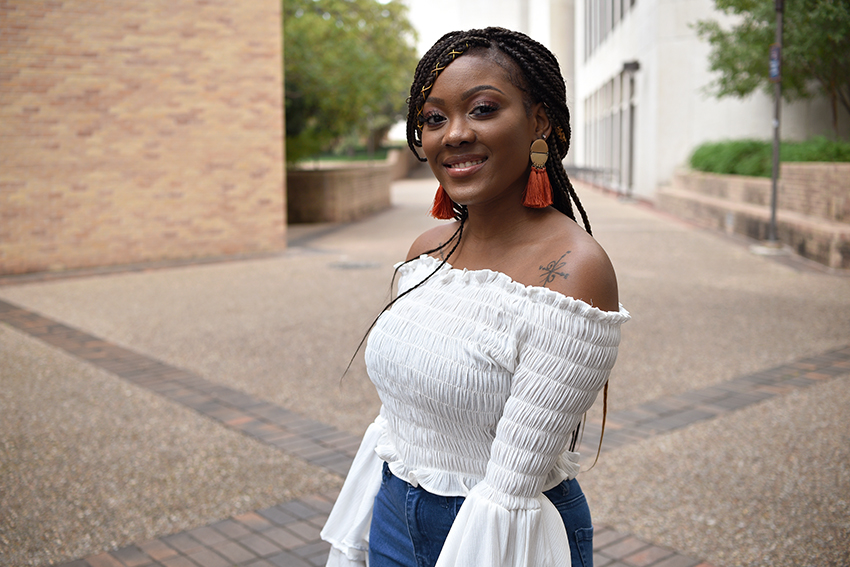Javonna Hamilton’s 2014 began with a gift she will never forget: her acceptance letter to the University of Texas at Austin. While her excitement was still high, she became overwhelmed once she started her undergraduate career.
“I honestly didn’t know what I was getting myself into,” said Hamilton, who is now an education psychology graduate student. “I never had that experience of my people coming before me to a four-year university, and no one could tell me how college was.”
As a first-generation graduate, Hamilton became the first in her family to earn a college degree last May. This was a huge accomplishment — but it wasn’t an easy journey for Hamilton. She had to rely on herself to find help.
Becoming a first-generation student
Hamilton remembers her career counselor in high school being there to help her apply for college and fee waivers, but they didn’t offer much guidance in selecting a school.
“My counselor would just say, ‘It’s whatever you want to do,’” Hamilton said. “It wasn’t like I had this knowledge of where I wanted to go, so I kind of just did it on a whim.”
Researching colleges fell on Hamilton and her mother, Patrice Edmond. Because Edmond had not attended college, Hamilton also had to educate her mom on college life to prepare their family for her future.
“She was so responsible. She was finding out everything on her own,” Edmond said.
Even with all her preparation, Hamilton had trouble adjusting to her first year as a psychology student at UT, especially with school work.
“I felt unprepared,” Hamilton said. “I didn’t feel like my high school science classes prepared me for the college ones.”
To cope, Hamilton started visiting the Sanger Learning Center for tutoring almost every day after her afternoon classes and often stayed there until the center closed.
Soon Hamilton’s grades improved, but she continued feeling intimidated as one of the few black students in her classes.
“(I had to) come to terms with being the only black person in my class, feeling like you automatically stand out just because the difference in appearance and not wanting to say anything stupid in class,” Hamilton said.
Finding support
Hamilton eventually joined the Fearless Leadership Institute, an initiative of the Division of Diversity and Community Engagement, during her second year. The institute works to support the academic, personal and professional development of women of color through weekly interest groups.
Tiffany T. Lewis, the institute’s co-director, said first-generation students like Hamilton often feel like they don’t belong in college, but they’re often just lacking support.
“Sometimes, the students who have experience or parents who have been to college, they kind of learn the tricks and trades of being a successful college student,” Lewis said.
Through the institute’s weekly meetings and retreats, Hamilton found other women of color, including other first-generation students, and gained confidence.
“It doesn’t matter if I am the only person of color in my classroom,” Hamilton said. “I deserve to be here just like everyone else.”
With this newfound confidence, Hamilton applied to join the McNair Scholars Program her junior year. The federally funded program mentors low-income, minority and first-generation students to get them into doctoral programs, especially in STEM fields.
After she was accepted into the McNair Scholars Program, she was paired with Ryan Sutton, a counseling psychology expert, and director with the Longhorn Center for Academic Excellence, as
her mentor.
Hamilton visited Sutton at least once a week — sometimes more, Sutton said.
Hamilton was finally comfortable with school and working toward graduate school. But she became strained by her finances, wondering if she would be able to complete college while working three part-time jobs.
“It was very draining,” Hamilton said. “I was very stressed out and I wasn’t getting a lot of sleep. I wasn’t able to pay for books sometimes. I found them on the internet and scraping for resources because I knew I couldn’t actually buy them.”
But Hamilton saved up money, and, with the help of a scholarship she learned about through the McNair program, she was able to continue in school and study abroad in Cape Town, South Africa, her senior year.
While applying and visiting graduate schools was more time consuming than her undergraduate application, McNair also helped Hamilton find the right graduate school for her.
“I was trying to apply and visit all the schools in one semester,” Hamilton said. “Without McNair, I wouldn’t have been able to visit the grad schools I was interested in. Even though I ended up staying at UT, it taught me a lot.”
This is why strong support networks are vital for first-generation students like Hamilton, said Sutton, Hamilton’s mentor.
“Getting connected with mentors or mentorship programs can put the resources there in front of (students),” Sutton said.
A second beginning
During the University-wide Spring Commencement in 2018, Javonna Hamilton saw her work pay off.
“In that moment, I realized that I was meant to be there and that I worked extremely hard to get to that point,” Hamilton said.
As a first-year masters’ student, Hamilton now works at the Fearless Leadership Institute as a graduate assistant. She is also a teaching assistant.
Hamilton’s mentors say she has visibly grown professionally and personally.
“She is definitely a more confident individual,” Lewis said. “She has brought a lot of hard work and innovation to our organization.”
Hamilton feels stronger now and sees her experience as a first-generation student as a tool to help others.
“Being a first generation (student), it’s so easy to see it as a weakness, but I feel like it’s also a strength,” Hamilton said. “You’re offering a new perspective. Your experience has shaped you to understand what having a lack of resources feels like.”





















